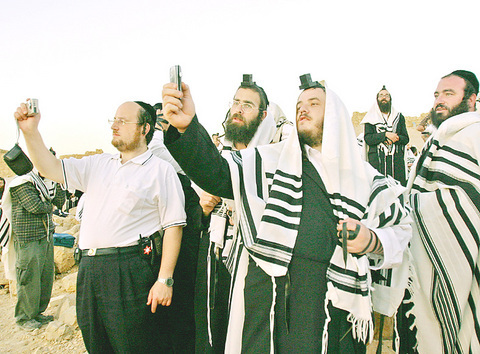It sounds like the setup for a punch line: What do you get when you cross an ultra-Orthodox rabbi with a mobile phone?
But the "kosher phone" is real and its developers are serious about looking beyond the religious enclaves of Israel. Some Arab companies have even inquired about the phone's main feature: keeping out sex lines and other worldly temptations.
"There's interest out there in a conservative phone," said Abrasha Burstyn, the chief executive officer at Mirs Communications Ltd, an Israeli subsidiary of Motorola Inc and pioneer of the kosher mobile that debuted last year.

PHOTO: AP
The phones -- carrying the seal of approval from Israel's rabbinical authorities -- have been one of the most successful mergers of technology and centuries-old tradition in the ultra-Orthodox community, which is most widely recognized by the men's black garb based on the dress of 19th century European Jews.
The kosher phone is stripped down to its original function: making and receiving calls. There's no text messaging, no Internet access, no video options, no camera. More than 10,000 numbers for phone sex, dating services and other offerings are blocked. A team of rabbinical overseers makes sure the list is up to date.
These are the same rabbis who have told followers to scorn television and radio. But mobile phones are considered just too essential in one of the world's most tech-friendly nations. The ultra-Orthodox account for about 14 percent of Israel's 7 million people.
Now Mirs is thinking bigger. Talks are under way to introduce a kosher phone to Jewish communities in the US and other nations possibly later this year. Israeli Arabs -- about 20 percent of the population -- have also taken notice of the phones as a possible option for those trying to protect conservative Islamic sensibilities.
Some Arab cellphone providers see the same attraction. They have sought information from Mirs via envoys from Jordan, which has a peace treaty with Israel, said Burstyn, who declined to give further details of the contacts.
"This was a unique product for a unique brand of customer," he said. "But we see some potential beyond this niche market."
The kosher phone is an example of demand leading the way for supply.
In late 2004, a special rabbinical panel was formed to study how to bridge the need for cellular phones and ultra-Orthodox codes. The community was torn.
Some saw the phones as a non-threatening convenience. Others believed the sophisticated "third generation" phones offered an unhealthy freedom: the ability to download pornography or allow young people to make furtive contact with the opposite sex -- which is highly restricted in ultra-Orthodox society. The conservative magazine Family called the multitasking new phones "a candy store for the evil impulse."
The rabbis' solution -- find a cell phone that's only a phone.

CHAMPIONS: President Lai congratulated the players’ outstanding performance, cheering them for marking a new milestone in the nation’s baseball history Taiwan on Sunday won their first Little League Baseball World Series (LLBWS) title in 29 years, as Taipei’s Dong Yuan Elementary School defeated a team from Las Vegas 7-0 in the championship game in South Williamsport, Pennsylvania. It was Taiwan’s first championship in the annual tournament since 1996, ending a nearly three-decade drought. “It has been a very long time ... and we finally made it,” Taiwan manager Lai Min-nan (賴敏男) said after the game. Lai said he last managed a Dong Yuan team in at the South Williamsport in 2015, when they were eliminated after four games. “There is

Taiwan Semiconductor Manufacturing Co (TSMC, 台積電) is expected to start construction of its 1.4-nanometer chip manufacturing facilities at the Central Taiwan Science Park (CTSP, 中部科學園區) as early as October, the Chinese-language Liberty Times (the Taipei Times’ sister newspaper) reported yesterday, citing the park administration. TSMC acquired land for the second phase of the park’s expansion in Taichung in June. Large cement, construction and facility engineering companies in central Taiwan have reportedly been receiving bids for TSMC-related projects, the report said. Supply-chain firms estimated that the business opportunities for engineering, equipment and materials supply, and back-end packaging and testing could reach as high as

POWER PLANT POLL: The TPP said the number of ‘yes’ votes showed that the energy policy should be corrected, and the KMT said the result was a win for the people’s voice The government does not rule out advanced nuclear energy generation if it meets the government’s three prerequisites, President William Lai (賴清德) said last night after the number of votes in favor of restarting a nuclear power plant outnumbered the “no” votes in a referendum yesterday. The referendum failed to pass, despite getting more “yes” votes, as the Referendum Act (公民投票法) states that the vote would only pass if the votes in favor account for more than one-fourth of the total number of eligible voters and outnumber the opposing votes. Yesterday’s referendum question was: “Do you agree that the Ma-anshan Nuclear Power Plant

Democratic nations should refrain from attending China’s upcoming large-scale military parade, which Beijing could use to sow discord among democracies, Mainland Affairs Council Deputy Minister Shen You-chung (沈有忠) said. China is scheduled to stage the parade on Wednesday next week to mark the 80th anniversary of Japan’s surrender in World War II. The event is expected to mobilize tens of thousands of participants and prominently showcase China’s military hardware. Speaking at a symposium in Taichung on Thursday, Shen said that Chinese Minister of Foreign Affairs Wang Yi (王毅) recently met with Indian Prime Minister Narendra Modi during a visit to New Delhi.